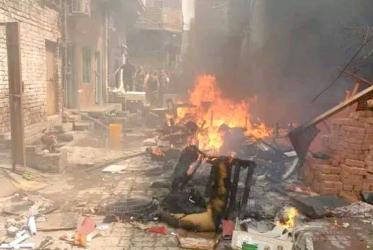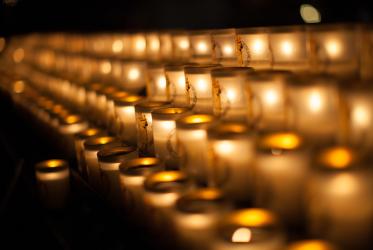‘ “No, my brother, do not force me; for such a thing is not done in Israel; do not do anything so vile! As for me, where could I carry my shame? And as for you, you would be as one of the scoundrels in Israel”’ (2 Samuel 13:12-14).
1. As the conflict in the Democratic Republic of Congo (DRC) continues, the brutal crimes of sexual violence against women have massively increased and become pervasive in the country, especially since the beginning of the military operations in January 2009. Thousands of women and young girls have suffered due to rape and forced sexual slavery, often being forced to also serve as soldiers on the frontiers. As the Special Rapporteur on Violence against Women in her report to the United Nations (UN) Human Rights Council in February 2008 stated, “sexual violence has a defining feature of the DRCs armed conflict”. Women in areas of armed conflict suffer sexual violence committed by various actors such as the Forces Armées de la République Démocratique du Congo (FARDC), the Police Nationale Congolaise (PNC), various armed groups and increasingly, civilians as well.
2. The situation of increasing sexual violence against women is most acute in South Kivu, where non-governmental armed groups, particularly militia from neighbouring countries, commit sexual atrocities that are of an unimaginable brutality, which go beyond rape and aim at the complete physical and psychological destruction of women as sexual slaves with implications for the entire society. Women are brutally gang raped, often in front of their families and communities. In numerous cases, male relatives are forced at gunpoint to rape their own daughters, mothers or sisters. Such women often end up being infected by HIV and stigmatized by their families and, if married, they are often deserted by their husbands. A concern was also expressed that security and the justice system fall short of addressing the problems of sexual violence and that women survivors of rape lack sufficient care and protection. The majority of sexual violence cases reported in North Kivu since January have been attributed to government soldiers. There were incidences reported that, in the Equateur province, soldiers and police officers have also carried out systematic reprisals against local civilians, including mass rape. With the preparation of military operations to hunt down the Forces Démocratiques de Libération du Rwanda (FDLR) fighters, civilians are increasingly becoming the victims of murder, home invasion and rape. As they operate from forest areas, these armed groups raid local communities, engage in pillage, forced labour, rape and the enslavement of women and girls.
3. An independent UN human rights expert reported to the UN General Assembly last year that the scale and brutality of the sexual violence faced by women in the DRC amounts to war crimes and crimes against humanity. The UN Security Council Resolution 1820 of June 2008 noted that rape and other forms of sexual violence can constitute a war crime, a crime against humanity, or a constitutive act with respect to genocide. The resolution also stressed the need for the exclusion of sexual violence crimes from amnesty provisions in the context of conflict resolution processes and called upon member states to comply with their obligations for prosecuting persons responsible for such acts, to ensure that all victims of sexual violence, particularly women and girls, have equal protection under the law and equal access to justice. However, a climate of impunity for crimes against women predominates across the DRC and local authorities do little to stop it or prosecute those responsible for the crimes. The justice system falls short of addressing the problems of sexual violence and women survivors of rape lack sufficient care and protection and, consequently, most survivors are socially stigmatized and HIV positive. Even the UN does not seem to have resources and effective mechanisms to deal with such deprivation of human dignity.
4. While this alarming situation of sexual brutalization of women continues in the DRC, it is deplorable that churches are not coming forward to condemn these evil atrocities. The churches seem to relegate sexual violence to the private sphere, and still understand violence as exclusively physical, disregarding the psychological, sociological and spiritual effects entirely, as well as the breakdown of community. “Open secrets” of religio-cultural, social and even church practices which put women’s lives at risk continue unabated, while sexual violence and the risks of HIV infection increase at an alarming rate every day. The message to the WCCs eighth assembly, at the end of the Decade of Churches in Solidarity with Women (1988-1998), was that “violence against women is a sin and therefore an offence against God”. The mission of the church as a whole is to imitate the compassion of Jesus Christ for fullness of life for all. The church must participate with confidence and compassion in eradicating all forms of violence. The WCC reiterates the need for its member churches to ensure that the innocent are protected and the oppressed are freed. Instead of continuing with the unjust trend of blaming the victim or accusing the survivor, as if she is the one who is the sinner, the perpetrators of violence should be addressed for transformative justice. As Genesis 1:27 states, God created both male and female in his own image, as such male and female are equal and so violence against women is a sin and against God’s will for fullness of life.
5. In view of the fact that all protective mechanisms have failed to combat the increasing sexual violence against women in the DRC, urgent measures have to be taken by various actors to prevent this dehumanization in that country. The survivors of sexual violence in the DRC need moral support to heal their wounds, to overcome gender-based discrimination and the continuous threat to their life and security. WCC member churches, civil society organizations, the Congolese government and the international community have responsibilities to address this concern.
The central committee of the WCC, meeting in Geneva, Switzerland, 26 August - 2 September 2009, therefore:
A. Urges WCC member churches to publically condemn violence against women and to make constructive efforts to overcome such violence by declaring that violence against women is a sin and by the development of clear sexual harassment policies that also spell out clearly the consequences of such harassments.
B. Encourages all WCC member churches to continue offering solidarity to the women of the Democratic Republic of Congo (DRC) so that they know that they are not alone in their struggles and by the initiation of public campaigns to combat violence in the framework of the WCC Decade to Overcome Violence (2001-2010).
C. Appeals to WCC member churches and civil society organizations to create the space for women to network with each other from all corners of the DRC and also with their sisters from the rest of the continent, as well as the rest of the world, in order to empower women through solidarity and promote healing.
D. Calls upon WCC member churches to humbly acknowledge their sin of omission by remaining silent regarding the deprivation of human dignity and the loss of life through AIDS suffered by women and to provide processes of repentance, forgiveness, transformation and restoration through a credible truth and reconciliation commission which consists of all stakeholders who have been accompanying victims of such abuses.
E. Encourages WCC member churches to commit themselves to working out ways of journeying together through pastoral and psychological care with all who bear the trauma that violence of different forms has caused them. This may include working with other organizations, specifically the women’s department of the Eglise du Christ au Congo (ECC), to develop vocational training for victims so that they can sustain themselves and also by promoting legal mechanisms so that the perpetrators of violence are brought to justice. The member churches are also encouraged to develop educational strategies which work with young boys and girls, in order to eliminate gender stereotypes.
F. Urges all parties to the armed conflict to immediately commit themselves to putting an end to all acts of sexual violence against women and girls in the DRC.
G. Supports the demand for the Congolese government (DRC) to end impunity for rape and to evolve effective strategies to combat sexual violence.
H. Urges the Congolese government (DRC) to bring to justice those responsible for committing sexual violence.
I. Urges that the Congolese government (DRC) guarantee the security of all its citizens and in particular protect women and girls from all forms of sexual violence.
J. Supports the recommendations made by the Special Rapporteur on Violence against Women to the UN Human Rights Council (February 2008) that the Congolese government, the UN, in particular the UN Mission in the DRC, the International Criminal Court and the international community implement adequate steps to end the sexual violence against women in the country.
K. Requests that the secretary general of the UN establishes directives and strategies that will enable the UN Mission in the DRC in the respect of its mandate to better protect civilians, especially women and girls who are trapped in combat zones, against all forms of sexual violence.
The following prayer is offered as a resource to enable the churches’ engagement with the issue articulated above:
The WCC member churches call on all churches to continue praying for God’s intervention to end the violence and for His strengthening power to support the victims of violence in the Congo:
God who is the creator, redeemer and sustainer of life in all its fullness,
we bring before you women and girls who are denied the joy and abundance of life because of the violence perpetrated against them.
Violence against women and girls is a sin, depriving them of justice and human love.
Yet in the midst of such pain and degradation, we believe that you hold each abused girl and woman in the cradle of your hand, calling her name, enfolding her with compassion, sharing with her the same protecting love your blessed mother shared with you in your humanity.
Forgive us for the occasions when we have remained silent in the face of such suffering.
Forgive us for the times we have failed to name the violence as a sin and an offence against you.
Forgive us when we perpetuate cultural, social and church practises which put the lives of women and girls at risk.
And in granting us your forgiveness,
Empower us to act in solidarity with women and girls entrapped in violence and suffering.
Make us advocates of transformative justice seeking truth and reconciliation for individuals and communities.
Create within us a desire to work for the inclusive community of women and men, made in your image and partners in your mission.

